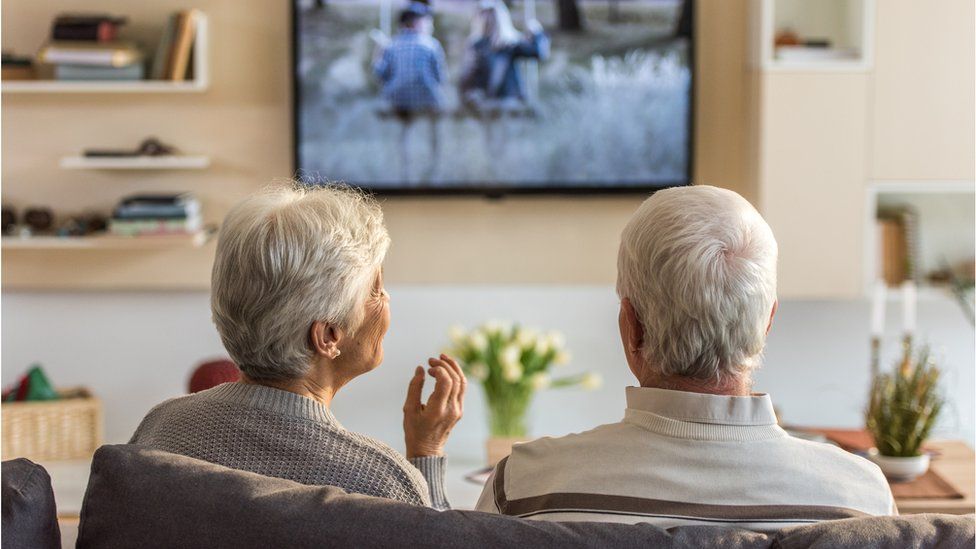BBC News 8 July 2021 - by Kevin Peachey
The chancellor has given his strongest indication yet of ruling out a predicted 8% rise in the state pension next year.
Official forecasts suggest that the link with earnings growth could mean the bumper rise in the amount paid from April 2022.
Rishi Sunak told the BBC a decision on pensions would be "based on fairness for pensioners and for taxpayers".
However, groups representing older people say the government's promises to pensioners should remain.
Mr Sunak told BBC Radio 4's Today programme: "The triple lock is government policy but I recognise people's concerns about what that might mean, given some of the numbers that are being put around.
"We will approach these decisions with fairness in mind - fairness for both pensioners but also for taxpayers."
He said there were "some questions around the earnings numbers".
Why would the state pension rise?
The rise in pensions each year is governed by what is known as the triple lock - a Conservative manifesto promise until at least 2024.
This means the state pension increases in line with the rising cost of living seen in the Consumer Prices Index (CPI) measure of inflation, increasing average wages, or 2.5%, whichever of those three is highest.
Predictions by the Bank of England suggest that average earnings could go up by 8%, hence the equivalent rise in the state pension.
That would cost the Treasury £3bn more than previously anticipated, according to the government's official forecaster - the Office for Budget Responsibility.
Many economists point out the sharp rise in earnings is an anomaly created, in part, by calculations being affected by people coming off furlough.
Can the chancellor break the promise?
There is no reason in law why the chancellor cannot change the way earnings are judged in the triple lock system.
He is certainly under pressure to do some from some quarters.
Lord David Willetts, president of the Resolution Foundation, a think tank focusing on people on lower incomes, said: "The Covid crisis has laid bare the design faults of the triple lock, with a severe jobs crisis last year inadvertently contributing to an unnecessary and unjustified 8% rise in the state pension next year.
"The chancellor should take the opportunity this autumn to replace the triple lock with a smoothed earnings link. This would mean the state pension would rise in line with the living standards of working age people - a change that would be fair to all generations."
How can 'fairness' be judged?
The chancellor said that he would hold "fairness in mind" for any decision that it is made, but fairness can be hard to quantify.
At present:
- The new flat-rate state pension (for those who reached state pension age after April 2016) is £179.60 a week
- The old basic state pension (for those who reached state pension age before April 2016) is £137.60 a week
That is one of the least generous state pensions in Europe, even if there was a significant rise next year.
The former pensions minister, Baroness Ros Altmann, also pointed out that, for many people, the state pension was their only retirement income.
"Millions of pensioners - especially women - rely solely on state pensions because they did not have the opportunity to build up private pensions when younger," she said.
She has called for a wholesale review of pensioner benefits, rather than a short-term change in the rules.
Other considerations of "fairness" might also include the wide range of life expectancy in different parts of the country, the different rules determining the rise in Pension Credit - a state pension top-up, and the expectations of younger people about their eventual state pension entitlement.
At a time when the official recommendation for the main NHS pay award is well below inflation, a rise of 8% for the state pension would appear to be an outlier.
The chancellor's comments this morning are the clearest indication that it will not happen.
To be clear, it is very much a distortion. Average earnings were depressed in the pandemic by a reduction in hours worked. The official figures showed earnings were falling. From this lower base, the resumption of normality will lead to a very high number, when comparing one quarter this year to the same quarter in 2020 during lockdown.
But this also reflects the design of the triple lock. As the OBR put it, "it has no memory". The point of the lock was, last year, to deliver a 2.5% rise in pensions this year, despite earnings being -1% and inflation being just 0.5%.
The state pension was shielded from what was happening everywhere else in the economy last year. But its current design disregards that history and will lead to a compensatory bumper boost, if it is measured as in the past (growth in the quarter to July over same quarter last year), although we won't get the figures until autumn.



